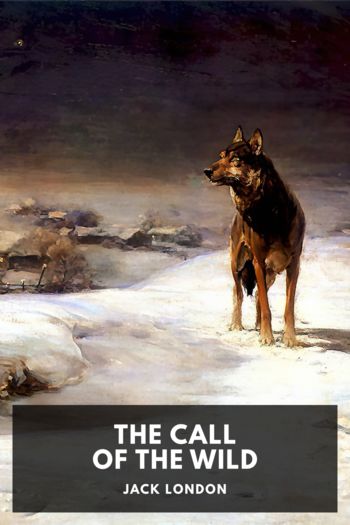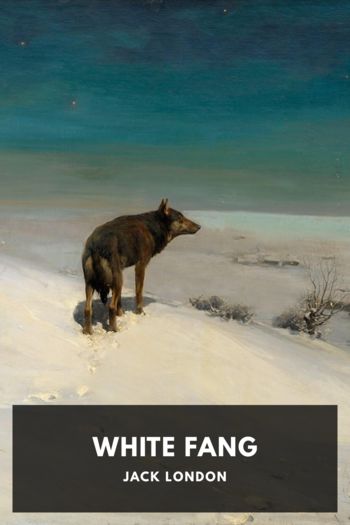The Call of the Wild, Jack London [read me a book .txt] 📗

- Author: Jack London
Book online «The Call of the Wild, Jack London [read me a book .txt] 📗». Author Jack London
It was a hard day’s run, up the Canyon, through Sheep Camp, past the Scales and the timber line, across glaciers and snowdrifts hundreds of feet deep, and over the great Chilcoot Divide, which stands between the salt water and the fresh and guards forbiddingly the sad and lonely North. They made good time down the chain of lakes which fills the craters of extinct volcanoes, and late that night pulled into the huge camp at the head of Lake Bennett, where thousands of goldseekers were building boats against the breakup of the ice in the spring. Buck made his hole in the snow and slept the sleep of the exhausted just, but all too early was routed out in the cold darkness and harnessed with his mates to the sled.
That day they made forty miles, the trail being packed; but the next day, and for many days to follow, they broke their own trail, worked harder, and made poorer time. As a rule, Perrault travelled ahead of the team, packing the snow with webbed shoes to make it easier for them. François, guiding the sled at the gee-pole, sometimes exchanged places with him, but not often. Perrault was in a hurry, and he prided himself on his knowledge of ice, which knowledge was indispensable, for the fall ice was very thin, and where there was swift water, there was no ice at all.
Day after day, for days unending, Buck toiled in the traces. Always, they broke camp in the dark, and the first gray of dawn found them hitting the trail with fresh miles reeled off behind them. And always they pitched camp after dark, eating their bit of fish, and crawling to sleep into the snow. Buck was ravenous. The pound and a half of sun-dried salmon, which was his ration for each day, seemed to go nowhere. He never had enough, and suffered from perpetual hunger pangs. Yet the other dogs, because they weighed less and were born to the life, received a pound only of the fish and managed to keep in good condition.
He swiftly lost the fastidiousness which had characterized his old life. A dainty eater, he found that his mates, finishing first, robbed him of his unfinished ration. There was no defending it. While he was fighting off two or three, it was disappearing down the throats of the others. To remedy this, he ate as fast as they; and, so greatly did hunger compel him, he was not above taking what did not belong to him. He watched and learned. When he saw Pike, one of the new dogs, a clever malingerer and thief, slyly steal a slice of bacon when Perrault’s back was turned, he duplicated the performance the following day, getting away with the whole chunk. A great uproar was raised, but he was unsuspected; while Dub, an awkward blunderer who was always getting caught, was punished for Buck’s misdeed.
This first theft marked Buck as fit to survive in the hostile Northland environment. It marked his adaptability, his capacity to adjust himself to changing conditions, the lack of which would have meant swift and terrible death. It marked, further, the decay or going to pieces of his moral nature, a vain thing and a handicap in the ruthless struggle for existence. It was all well enough in the Southland, under the law of love and fellowship, to respect private property and personal feelings; but in the Northland, under the law of club and fang, whoso took such things into account was a fool, and in so far as he observed them he would fail to prosper.
Not that Buck reasoned it out. He was fit, that was all, and unconsciously he accommodated himself to the new mode of life. All his days, no matter what the odds, he had never run from a fight. But the club of the man in the red sweater had beaten into him a more fundamental and primitive code. Civilized, he could have died for a moral consideration, say the defence of Judge Miller’s riding-whip; but the completeness of his decivilization was now evidenced by his ability to flee from the defence of a moral consideration and so save his hide. He did not steal for joy of it, but because of the clamor of his stomach. He did not rob openly, but stole secretly and cunningly, out of respect for club and fang. In short, the things he did were done because it was easier to do them than not to do them.
His development (or retrogression) was rapid. His muscles became hard as iron, and he grew callous to all ordinary pain. He achieved an internal as well as external economy. He could eat anything, no matter how loathsome or indigestible; and, once eaten, the juices of his stomach extracted the last least particle of nutriment; and his blood carried it to the farthest reaches of his body, building it into the toughest and stoutest of tissues. Sight and scent became remarkably keen, while his hearing developed such acuteness that in his sleep he heard the faintest sound and knew whether it heralded peace or peril. He learned to bite the ice out with his teeth when it collected between his toes; and when he was thirsty and there was a thick scum of ice over the water hole, he would break it by rearing and striking it with stiff forelegs. His most conspicuous trait was an ability to scent the wind and forecast it a night in advance. No matter how breathless the air when he dug his nest by tree or bank, the wind that later blew inevitably found him to leeward, sheltered and snug.
And not only did he learn by experience, but instincts long





Comments (0)